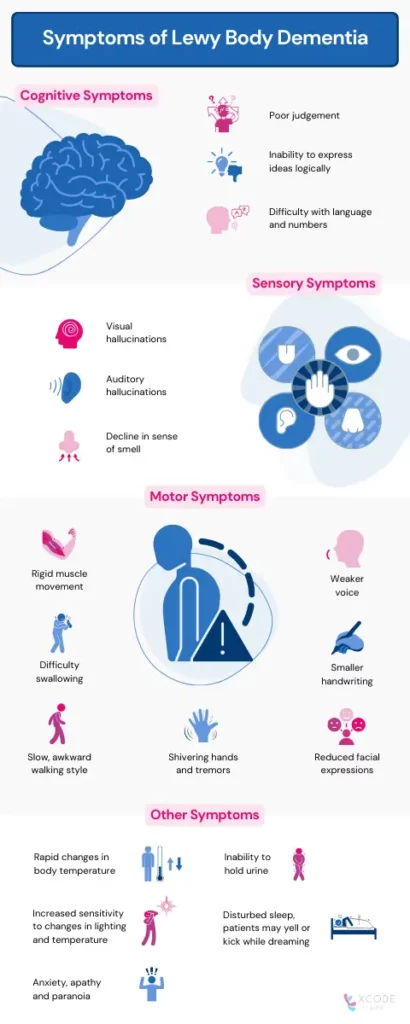Did you know that Lewy body dementia is 1.5 times more likely to manifest in males rather than females? This condition affects 1.4 million people and their families across the US. If you're wondering what Lewy bodies are, they are clumps of alpha-synuclein protein. They accumulate in the brain, leading to an increasingly severe loss of brain function. Bringing awareness and understanding to this condition can help those affected by Lewy body dementia manage it better. This article will explore the 7 stages of Lewy body dementia and explain everything you need to know about the disease.
How To Know If You Have Lewy Body Dementia
Parkinson's patients have Lewy bodies in their brains, too. That's why people who have been diagnosed with Parkinson's can end up with Lewy body dementia.
Read on to learn about the characteristic symptoms of this disease.

Cognitive Symptoms
Lewy body dementia limits the capability to think and process information.
The main symptoms present in Lewy body dementia but not in Alzheimer's include:
- Poor judgement
- Difficulty with language and numbers
- Illogical statements and ideas
Most patients experience episodes of delirium, with blank faces and slurred speech.
These phases can last hours or even days.
Sensory Symptoms
Patients with Lewy body dementia (LBD) often experience visual hallucinations featuring humans or even animals.
A few patients have even reported hearing and smelling things that aren't there.
Some even say their sense of smell got worse with time.
Motor Symptoms
Difficulty in movement is a common symptom of Parkinson's disease, and this is seen in LBD as well.
They can include:
- Rigid muscle movement
- Shivering hands
- Tremors
- Slow, awkward walking style
- Difficulty swallowing
Subtle signs of the loss of motor function include:
- Smaller handwriting
- Reduced facial expressions
- Weaker voice
Other symptoms
LBD affects the regulation of other organs via the nervous system.
Dysregulated organs could cause:
- Inability to hold urine
- Rapid changes in body temperature
- More sensitivity to external changes in lighting or temperature
- Behavioral symptoms like anxiety, apathy, and paranoia
- Trouble while sleeping, with dreaming patients yelling or kicking
The 7 Stages Of Lewy Body Dementia
Understanding how this condition progresses can help afflicted people and their families manage the condition better at each step of this challenging journey.
- No cognitive decline:
In this stage, no symptoms are noticeable to the patient or others.
They live life with no interruptions or inconveniences.
Unseen to anyone, proteins begin accumulating in the brain, eventually leading to the formation of Lewy bodies.
- Very mild cognitive decline:
Minor instances of forgetfulness begin to take place.
There are rare instances of interruption in day-to-day life and activities.
Since mild lapses in reasoning are also symptoms of aging, it is hard to diagnose at this stage.
- Mild cognitive decline:
In the third stage of the condition, the symptoms become more apparent.
The memory loss worsens, and concentration becomes more difficult for the patient.
Maintaining a schedule becomes harder and harder.
By this time, those around the patient have noticed a decline in brain function and have begun to explore treatment and care options.
- Moderate cognitive decline:
The loss of memory begins to take a toll on the patient's near and dear ones. Remembering recent events and even faces becomes a chore at this stage.
Performing day-to-day tasks becomes difficult.
It is at this stage that most patients seek medical intervention and are diagnosed with dementia.
- Moderately severe cognitive decline:
The patient starts to depend on others for bathing and dressing.
Short-term memory loss becomes significant, leading to disorientation and frustration. For now, long-term memories remain preserved.
- Severe cognitive decline:
Significant memory loss accompanies a shift in personality.
At this stage, patients need constant aid to get through all parts of their day, including eating and bathing.
Swallowing and speaking become more difficult due to weaker throat muscles.
- Very severe cognitive decline:
A large number of patients lose their ability to communicate verbally.
A handful of patients are no longer able to walk by this stage.
As their physical health worsens, their caregivers focus on comfort and quality of life. The last stage of LBD ends within 1.5 to 2.5 years.
Is There A Genetic Component To Lewy Body Dementia?
A study published in Elsevier suggests that varied genetic components could lead to LBD.
These genes are related to the working of proteins in the central nervous system.
Mutations in the SNCA and SNCB genes affect neurotransmitter production in the brain, making it harder to think and recall information.
Eventually, misshapen proteins accumulate in the brain, forming Lewy bodies.
What are some other risk factors for Lewy body dementia?
- Lewy body dementia traditionally affects people aged 50 and above.
- Prior diagnoses of anxiety and depression have been present in a majority of subjects ailing from Lewy body dementia.
- Males are 1.5 times more likely to suffer from Lewy body dementia.
- A family history of Parkinson's disease increases the risk of Lewy body dementia.
- Caffeine users have a reduced risk of developing Lewy body dementia.
- Occupations with more cognitively stimulating work are less likely to lead to Lewy body dementia.
- Interestingly, a diagnosis or family history of cancer correlates to a reduced risk of neurodegenerative diseases.
Getting An Accurate Diagnosis Of Lewy Body Dementia
It can be hard to diagnose LBD against other neurodegenerative disorders.
The only reliable technique available right now is an autopsy.
Thus, doctors rely on other tests to study brain function.
- PET scans
- CT scans
- Sleep studies
The one-year rule helps differentiate LBD from other subtypes.
If dementia appears within one year of Parkinson's symptoms, the patient likely has LBD.
Further research into diagnosis through studying blood and cerebrospinal fluid is ongoing.
If successful, LBD could be diagnosed earlier with more accuracy.
Treatment Options For Lewy Body Dementia
What Medications Can You Take?
There are several medications available to manage the different types of symptoms experienced:
- Cholinesterase inhibitors and Namenda - cognitive symptoms
- Levodopa - motor symptoms
- Quetiapine, clozapine, and pimavanserin - psychotic/hallucinatory symptoms
- Melatonin or clonazepam - sleep disturbances
What Other Therapies Are Available?
- Lifestyle changes to diet, exercise, and socialization
- Physical therapy to strengthen gait, flexibility, and balance
- Speech therapy to rejuvenate the throat muscles
- Occupational therapy to retain functional skills in day-to-day life
- Music or aromatherapy to enhance the patient's mood in the short term
It's important to remember to consult a physician about relevant medication or therapies for your condition.
Frequently Asked Questions
What Is The Longest You Can Live With Lewy Body Dementia?
Although the average life expectancy is 5-8 years after diagnosis, some people have lived up to 20 years with the condition.
What Causes Death In Lewy Body Dementia?
Lewy body dementia weakens throat muscles. This deterioration can lead to food or water reaching the lungs, resulting in a fatal case of pneumonia. In most cases, patients succumb to pneumonia or heart failure.
What Is Sundowning?
Changes in lighting at dusk can lead to confusion, restlessness, agitation, and distress in patients suffering from Lewy body dementia.
Summary: The 7 Stages Of Lewy Body Dementia
- The 7 stages of Lewy body dementia range from no cognitive decline to very severe cognitive decline over 5 to 8 years.
- Lewy body dementia is a common sight in patients with Parkinson's disease
- Patients with Lewy body dementia exhibit cognitive symptoms (delirium, memory loss), motor symptoms (tremors, rigid movements) among others (sleep disturbances, body temperature changes)
- PET/CT imaging or a physical examination can help with a reasonably accurate diagnosis of Lewy body dementia.
- Doctors can treat Lewy body dementia with medication or therapy for physical fitness, emotional stability, and mental health.
References
Lewy body dementia - Symptoms and causes - Mayo Clinic
Diagnosing Lewy Body Dementia: For Professionals | National Institute on Aging (nih.gov)
Lewy Body Dementia: Symptoms, Stages, & Treatment (webmd.com)
Dementia with Lewy bodies - Treatment - NHS (www.nhs.uk)
Lewy body dementia - PubMed (nih.gov)
Risk factors for dementia with Lewy bodies - PMC (nih.gov)






